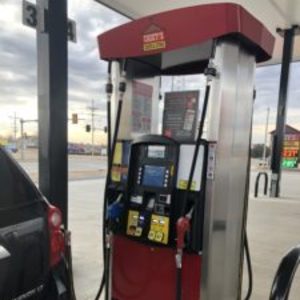Casey's, Kansas Corn announce expansion of E15 fuel

PHOTO: Kansas Corn Commission
July 15, 2019
BY Kansas Corn Commission
Casey’s General Stores and the Kansas Corn Commission have announced the addition of E15 fuel at several Casey’s locations across Kansas, providing Kansas drivers with a lower-priced, cleaner fuel option. With EPA’s recent approval of year-round E15 sales, the Kansas Corn Commission and Casey’s General stores are moving forward with efforts to expand the availability of E15 fuel. Casey’s has committed to expanding its E15 fuel, known as Unleaded 88, to 12 additional Kansas stations. E15 is already available at ten Casey’s Kansas stations. The higher-octane fuel contains 15 percent ethanol is approved for use in passenger cars, trucks and SUVs model year 2001 and newer.
“Casey’s is quickly embracing the value of expanding consumer choice by offering E15 fuel to many of its stations in Kansas,” said Kansas Corn Commission Chairman Dennis McNinch. “EPA’s decision to allow year-round sales of E15, coupled with the Kansas Corn Commission’s incentive program for ethanol retailers are making this expansion possible.”
The Kansas Corn Commission, through its Ethanol Expansion Program, is working with fuel retailers to expand the availability of E15 in Kansas. Casey’s Kansas expansion is part of a larger effort to add E15 to Casey’s stores in several states. The company attributed this rapid expansion to the lifting of an outdated regulation that now allows American drivers to access the cleaner, more affordable biofuel all year-round.
Advertisement
Advertisement
“The summertime E15 restrictions have been a major concern for us for a long time and would typically slow down our E15 expansion,” said Casey’s Director of Fuels Nathaniel Doddridge. “Now that we know we can provide our guests with a consistent experience at the fuel pump year-round, we are expanding E15 at a faster pace to stay ahead of our competition.”
The Kansas Corn Commission actively promoted ethanol fuels for years, and the corn checkoff provides incentives to help expand the availability of ethanol, McNinch said.
“This is a big win for Kansas consumers and Kansas farmers,” McNinch said. “Ethanol production already benefits farmers and rural communities and our state. With the removal of an unnecessary regulation that limited E15 sales, fuel retailers are able to add E15, giving consumers access to a lower priced, higher octane, cleaner fuel.”
Advertisement
Advertisement
E15 Unleaded 88 fuel is currently available at Casey’s General Stores in ten Kansas communities: Smith Center, Lenexa, Olathe, Overbrook, Seneca, Topeka, Dodge City, Galena, Hugoton and Douglass. E15 Unleaded 88 is coming to Casey’s in Sterling, Hesston, Ulysses, Pratt, Girard, Osawatomie, Wichita, Lakin and Wellsville, and will be offered in new stations being built in Lawrence, Tonganoxie and Louisburg.
Kansas Corn continues its work with fuel retailers to provide more access to E15 fuel, which is already available at 31 fuel stations across Kansas. Learn more at kscorn.com and find a Kansas E15 station by visiting fueledbykansas.com
Related Stories
The U.S. Department of Energy’s Office of Energy Efficiency and Renewable Energy is soliciting public comments on a preliminary plan for determining provisional emissions rates (PER) for the purposes of the 45Z clean fuel production credit.
On July 17, Iowa’s cost-share Renewable Fuels Infrastructure Program awarded $1.12 million in grants for 20 applicants to add B11 and 4 applicants to add E15 to retail sites. This was the first meeting following the start of RFIP’s fiscal year.
Par Pacific Holdings Inc., Mitsubishi Corp. and ENEOS Corp. on July 21 announced the signing of definitive agreements to establish Hawaii Renewables LLC, a joint venture to produce renewable fuels at Par Pacific’s refinery in Kapolei Hawaii.
A new study published by the ABFA finds that the U.S. EPA’s proposal to cut the RIN by 50% for fuels made from foreign feedstocks, as part of its 2026 and 2027 RVOs, could stall the growth of the biomass-based diesel (BBD) industry.
The European Commission on July 18 announced its investigation into biodiesel imports from China is now complete and did not confirm the existence of fraud. The commission will take action, however, to address some systemic weaknesses it identified.
Upcoming Events










